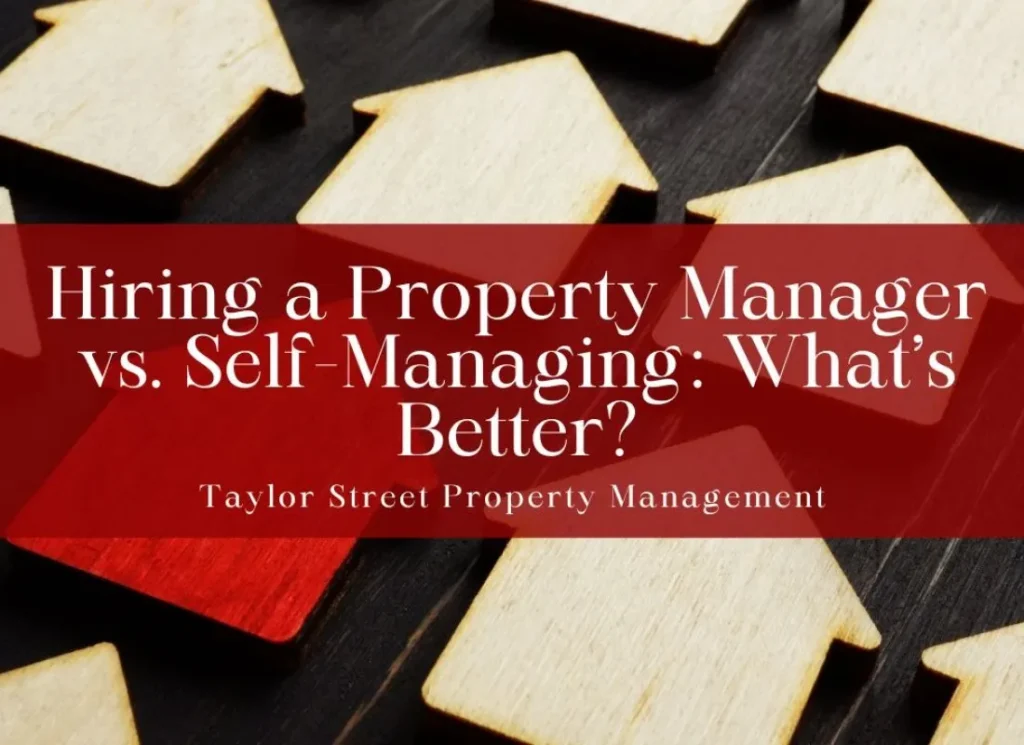A rental property’s performance and profitability greatly depends on its management. So, the choice of who will look after the property is crucial.
Managing your property alone is generally preferable for people with the time, expertise, experience, and resources. But some property owners may choose to employ a property manager to handle their duties so they can focus on enjoying their returns rather than dealing with the bother.
To assist you in selecting the best course of action for your rental property, we at Taylor Street Property Management will compare each option for you in this article.
The Advantages of Managing Your Property Alone

Immerse Yourself in the Industry
First, there is no better way to familiarize yourself with a field than by diving right in. If you own and manage the property, you will need to swiftly learn the ins and outs of the sector, from rules and regulations to tenant management quirks.
Building Relationships
Dealing directly with tenants and building relationships will help you understand them better and enable you to provide better service to increase tenant retention.
Economically Sound
Finally, self-management is far more economical. Typically, a property manager will charge a certain percentage of the monthly rent plus expenditures.
Additionally, you can prioritize the success of your rental investment is necessary if you own a rental property. Your property may not be at the top of the list of properties that property managers are prioritizing and managing at any one time.
Disadvantages of Self Management
Takes Significant Time
It’s not easy running an investment property. To achieve, among other things, you need perseverance, dedication, time management skills and diligence. You’ll have duties including finding renters, caring for the apartment, and collecting rent.
Understanding the Laws is Compulsory
You must abide by the state’s landlord-tenant regulations. These regulations include the Fair Credit Reporting Act, the Eviction Laws, Security Deposit Rules, Warranty of Habitability, safety standards and Fair Housing Laws.
If you don’t understand these laws, you could get into a lot of trouble. A property manager will have the knowledge and expertise required to support your success and keep you out of trouble with the law.
Insufficient Resources
As they can operate at economies of scale, property managers can afford to invest less money in cutting-edge technologies. But, as a self-managing landlord, investing in technology has a low return on investment for you, especially if you’re just getting started.

Why You Should Hire a Property Manager
A property manager may quickly find a stress-free solution in the event of a crisis by bringing their network of contacts, legal knowledge, and vendors to the table. A property owner with a varied portfolio that spans multiple states may also be more likely to require a nearby property manager who can be more involved in day-to-day rental management.
A property manager also has more experience and knowledge of the market. Property managers gain an advantage by belonging to specialized real estate groups. They are better able to handle rental properties and find quality tenants since they have experience in the field and have been exposed to a variety of circumstances.
Finally, property managers bring years of experience and expertise to the table. A qualified property manager will also help the property owner optimize their tax deductions by keeping track of all rules and regulations and being knowledgeable about real estate codes and regulations to guarantee that they are followed.
The Cons of Hiring a Property Manager
Associated Costs
When selecting a property manager, the cost is a can be a concern. But this cost varies according to the services provided. Additionally, although some businesses charge owners a set fee, others do it on a percentage basis.
Quality of the Manager
No two property management firms are alike. So, if you hire the incorrect person, you’ll undoubtedly set yourself up for failure.
Priority
Usually, a property management business will oversee several properties at once. There’s a chance your home won’t get the attention you expect, which could lead to extra expenses and strained relations with your tenants.
Misaligned Incentives
In order to maintain a high level of cash flow and prevent the cost of vacancies and tenant searches, it is in the owner’s best interest to keep a property completely occupied. The manager might not pay as close attention to long-term residents if they receive a bonus or commission for signing up new tenants.
Which is Better for You? Property Management vs. Self-Management.

Thanks to rental property management software, self-administration is fortunately, growing simpler. Using free web software, many of the tasks typically performed by property managers, such as maintaining rental property finances, taking care of rent collecting, and managing tenant communications, may be automated.
Many people opt to hire a professional manager because they either don’t have the time or motivation to do a good job or have amassed so many properties that professional management is the only option.
Bottom Line
Self-management is challenging, time-consuming, and comes with a lot of responsibilities. These regular responsibilities and obligations won’t stop expanding as long as you keep buying more properties.
When you hire us, you can hand over the concerns and duties to Taylor Street Property Management. You will have more time for vital tasks and activities as a result.


